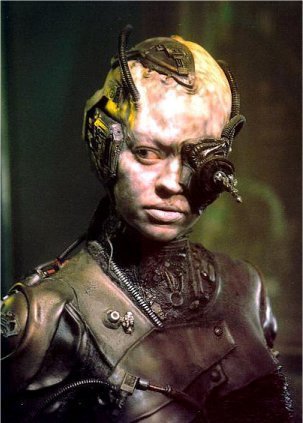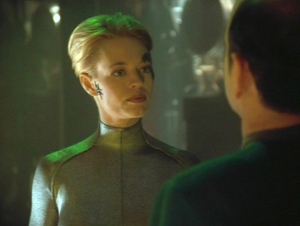About a month ago, I sat through a season four episode of Star Trek: Voyager that left me feeling deeply uncomfortable. No, not the one where B’Elanna succumbs to oxygen deprivation and declares her misguided love for Paris. As troubling as that installment was, it was an arc in the first few episodes of season four, culminating in “The Gift,” that had my jaw on the floor.
A brief background on the episode before we wade into the (un)ethical subspace of the Delta Quadrant:
After striking a tenuous alliance with the Borg to defeat a common enemy, our wayward crew finds itself playing host to Seven of Nine, a member of the Borg whose connection to the Collective has been severed for the standard techno-magical reasons. A few other Borg henchmen are unceremoniously dispatched from Voyager after they betray the crew’s trust, leaving Seven of Nine to advocate for itself. (It should be noted here that the Voyager crew think of Seven of Nine as female, although at this point the Borg probably considers such gendered designations Irrelevant.) The crew digs into their effective captive’s history, discovering that Seven of Nine was once a little girl who was abducted and assimilated by the Borg. At that point, Captain Janeway makes it her mission to bring Seven of Nine back into humanity’s fold.

Seven of Nine, badass Borg
This is not the first time Janeway’s leadership has made me uncomfortable. I’m not sure I’d follow her home, especially if the option of joining Holo(hottie)-Chakotay in his coup were to worm its way out of its interactive fictional exercise and into reality. The point is, Seven of Nine wants to return to the Collective, or, barring that, be dropped onto the nearest hospitable world. Both of these requests are denied, as is her more basic request to maintain her personal (or species?) agency.
A crucial aspect of “The Gift’s” plot revolves around the ethical question of whether to return Seven of Nine to her original human state. Because she is no longer connected to other Borg, the Doctor determines that the human parts of her body are rejecting the Borg technology. Captain Janeway seizes upon Seven of Nine’s biological history as proof positive that she is fundamentally human and must, deep down, wish to become so again biologically. Janeway denies Seven of Nine the choice of whether to undergo what amounts to both major invasive surgery and a change in biological identity, instead claiming this as her prerogative, citing Noble Human Reasons.
In doing so, Janeway denies the Borg as a species the dignity of personal agency. And since what little humanity is left within Seven of Nine doesn’t readily (or recognizably) asset itself, Janeway takes it upon herself to speak on its behalf and give it more weight than the (very loud) assertions of the Borg part of Seven of Nine. Thus Janeway leverages her power as captain to declare Seven of Nine’s Borg identity invalid, clinging to the idea that what was once human must still be fundamentally so. She orders the Doctor to medically extract and enhance Seven of Nine’s available human biology, enabling it to completely eject her Borg DNA and technology. The Doctor, for his part, enables Janeway, and Seven of Nine is forced to become human against her will through a process that amounts to medical torture.
Why the Doctor doesn’t invoke his Hippocratic oath, as he did when Tuvix expressed his desire not to die (season 2, episode 24), is a major unanswered question. The Tuvix episode did a much better job of representing the complexity of the ethical dilemma at hand. There’s little such nuance here. Viewers are made aware of the opposing arguments [read: Seven of Nine’s position about her own body] only so they can be shut down by the characters who occupy the positions of power in the Federation hierarchy and along the moral axis of the cast.
One of the most maddening weaknesses of Star Trek‘s otherwise inclusive philosophy is its insistence that humanity is the pinnacle of existence. The episode is SO SURE of Janeway’s moral high-ground that it’s disturbing, which points to Star Trek‘s occasional failure to achieve the progressiveness it prides itself on espousing. Janeway’s position amounts to one of human species supremacy, echoing centuries of colonial white supremacy, and she imposes it on a being who is already in a disadvantaged position and has little recourse. Janeways repeatedly ignores Seven of Nine’s clearly stated desires and staunch refusals to grant consent. But in a heartbreaking irony, resistance for this Borg is indeed futile.

Seven of Nine, reluctant human
Once again, the female body is stripped of its agency and remade into society’s image. This time literally. Viewers are meant to side with Janeway’s view of the situation and cheer when humanity triumphs and they are able to count Seven of Nine (see what I did there?) as one of their own.
Perhaps contemporary discourse surrounding consent and identity politics is what’s causing me to react so negatively to this plot and character developments. I don’t doubt that the episode’s moral stance was better received when it aired in 1997. But today, these blatant denials of someone’s personal agency simply do not fly (puns are always intended).

